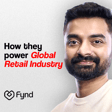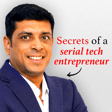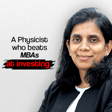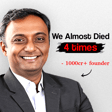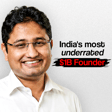
How to Scale Food Like Software - And Still Make Money | Jaydeep Barman (Rebel Foods)
"I have this fundamental belief that you make abnormal returns not when you are right but when people don't agree with you."
This contrarian mindset from Jaydeep Barman perfectly captures how Rebel Foods built a $1.4 billion unicorn by doing what everyone thought was impossible: decoupling restaurant brands from physical real estate.
Jaydeep Barman is the Co-founder and Group CEO of Rebel Foods, the world's largest internet restaurant platform operating 450+ cloud kitchens across 100+ cities in three countries. Under his leadership, the company processes 3 million orders monthly, generates ₹1,800+ crores in annual revenue, and achieved unicorn status at a $1.4 billion valuation. A former McKinsey Associate Partner with an MBA from INSEAD, Jaydeep pioneered the multi-brand cloud kitchen model that revolutionized how restaurants operate.
In this candid conversation with host Akshay Datt, he shares the journey from a failed Kolkata roll startup to building a category-defining global company.
Key Insights from the Conversation:
👉Contrarian Strategy: Being misunderstood by competitors created a protective moat during Rebel's early growth years
👉Cloud Kitchen Economics: 12-15 month payback periods with 25-30% monthly profits, dramatically better than traditional restaurants
👉Multi-Brand Innovation: Single kitchens operating 15+ brands simultaneously, maximizing asset utilization
👉Technology Moat: Proprietary Rebel OS automates cooking processes, ensuring consistency across hundreds of locations
👉Global Expansion: Strategic approach to international markets, focusing on structural advantages rather than rapid scaling
👉People Philosophy: Hiring for "founder mentality" over CVs, creating an intentionally "abnormal" company culture
#CloudKitchen #StartupFounder #FoodTech #Unicorn #RebelFoods #EntrepreneurJourney #StartupStrategy #FoodDelivery #BusinessModel #StartupPodcast #FounderStory #IndianStartups #RestaurantTech #VentureCapital #BusinessStrategy #Entrepreneurship #StartupLessons
Disclaimer: The views expressed are those of the speaker, not necessarily the channel
